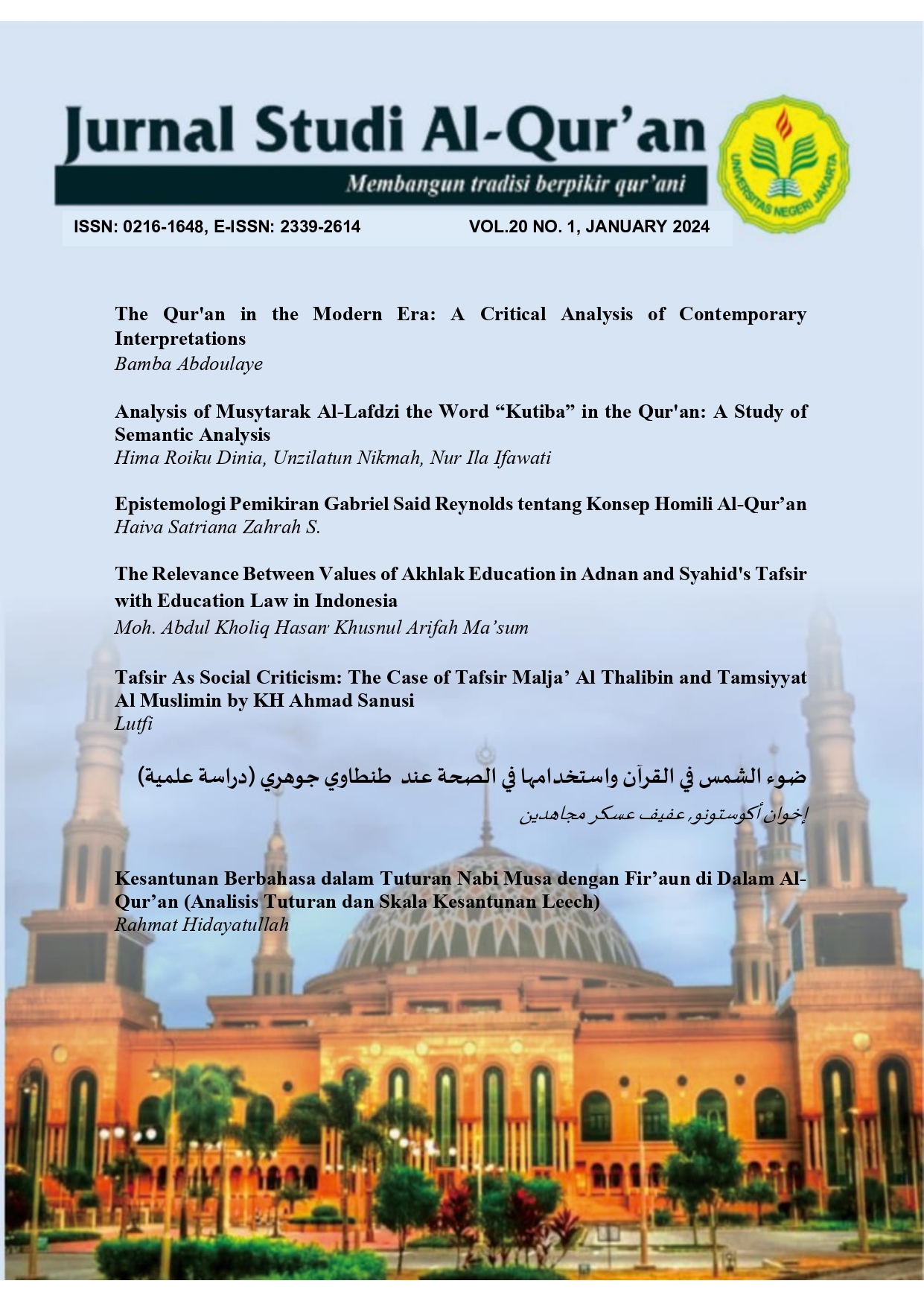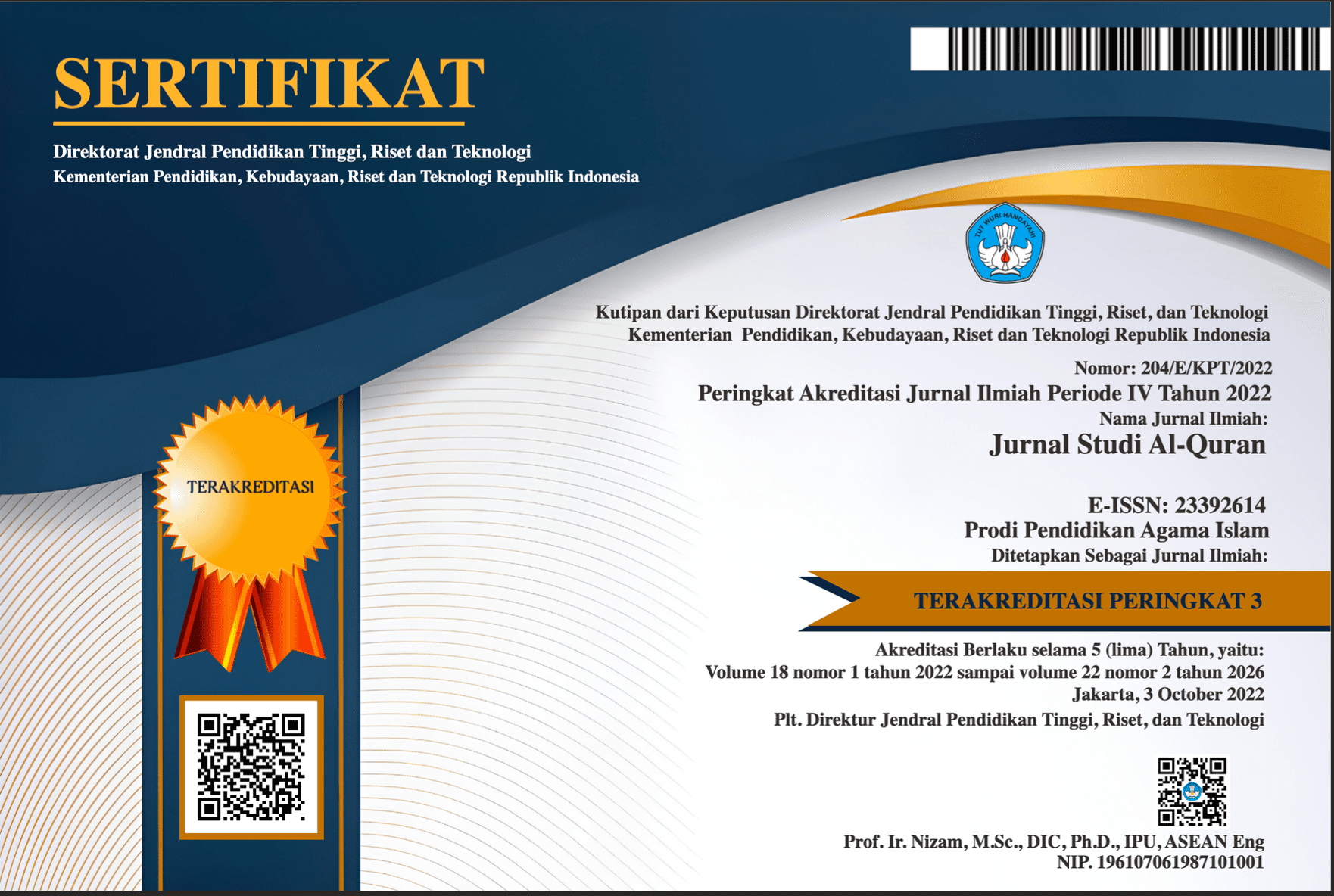Tafsir As Social Criticism: The Case of Tafsir Malja’ Al Thalibin and Tamsiyyat Al Muslimin by KH Ahmad Sanusi
DOI:
https://doi.org/10.21009/JSQ.20.1.05Keywords:
Tafsir, Ahmad Sanusi, Criticism, Islamic educationAbstract
This research examines two seminal works of Ahmad Sanusi, Malja’ al T{a>libin fi> tafsi>ri kala>mi robb al ‘a>lamin (in Sundanese) and Tamsiyat al muslimi>n fi> tafsi>ri kala>mi robb al ‘a>lami>n (in Indonesian Bahasa). By understanding Sanusi's interpretation and context of the production of the text, this research shows that Sanusi used his interpretation as a medium to criticize colonial government policies and emphasize the importance of education, especially mastering secular knowledge, besides the religious one to achieve Indonesian glory and independence. This research explores Sanusi’s anti-colonial criticism of the Teacher Ordinance Act, the prohibition of learning in pesantren and performing hajj. Furthermore, Sanusi encourages people to master secular sciences besides religious ones to achieve Indonesian independence. This research employs Hermeneutics to analyze Sanusi’s two books of tafsir. This method provides an understanding of the social, political, and cultural context of the production of the text.
References
Bakti, A.M.F. (1993). Islam and Nation Formation in Indonesia, McGiII University Montreal.
Benda, Harry J. (1955). Indonesian Islam Under the Japanese Occupation, 1942-45, Pacific Affairs, Vol. 28, No. 4.
Boland, B. J. (1983). The Struggle of Islam in modern Indonesia, The Hague: Martinus Nijhoff.
Bruinessen, M V. (1990), Kitab Kunming: books in arabic script used in the Pesantren milieu, brill
Darmawan, D. (2009). Ortodoksi Tafsir: Respons Ulama terhadap Tafsir Tamsjijjatoel-Moeslimien Karya K.H. Ahmad Sanusi, Dissertation, the Postgraduate School Syarif Hidayatullah State Islamic University Jakarta
Effendi. (2012). Politik Kolonial Belanda terhadap Islam di Indonesia dalam Perspektif Sejarah (Studi pemikiran Snouck Hurgronye), Jurnal TAPIs, Vol.8 No.1.
Falah, Miftahul. (2009). Riwayat Perjuangan K.H. Ahmad Sanusi. Sukabumi: MSI (Masyarakat Sejarawan Indonesia) Cabang Jawa Barat bekerjasama dengan Pemerintah.
Hasbullah. (1995). Sejarah Pendidikan Islam di Indonesia, Lintasan Sejarah Pertumbuhan dan Perkembangan, Jakarta: Raja Grafindo Persada.
Iskandar, Mohammad. (2001). Para pengemban amanah: pergulatan pemikiran kiai dan ulama di Jawa Barat, 1900-1950. Yogyakarta: Matabangsa.
-----------. (1993). “Kyai Haji Ajengan Ahmad Sanusi: Tokoh Kyai Tradisional Jawa Barat” in Pesantren, XXII, No.2, pp.71-86.
-----------. (2000). Peranan Elit Agama Pada Masa Revolusi Kemerdekaan. Jakarta. Departemen Pendidikan Nasional.
Laffan, Michael, Francis. (2003). Islamic Nationhood and Colonial Indonesia, Umma below the Winds. Routledge Curzon: London-New York.
Latief, Mohamad. (2018). “The Sociology of Knowledge: A Preliminary Analysis of The Sociological Approach to The Development of Islamic Religious Sciences.” Ulul Albab: Jurnal Studi Islam 19(2): 272–89. DOI: http://dx.doi.org/10.18860/ua.v19i2.5597
Maksum. (1999). Madrasah Sejarah dan Perkembangan, Jakarta: logos.
Matin, U. A. (2009). “K.H. Ahmad Sanusi (1888-1950): His Religio- Intellectual Discourse, and His Work Collection.” Lektur, 7(1): 147-64.
Miftahul, F. (2009). Riwayat perjuangan K.H. Ahmad Sanusi Bandung: Masyarakat Sejarawan Indonesia Cabang Jawa Barat.
Noer, Deliar. (1994). Gerakan Modern Islam di Indonesia 1900-1942, Jakarta: LP3ES
Nurtawab, E. (2009). The Tradition of Writing Qur’anic Commentaries in Java and Sund. Suhuf, 2(2), 163–195.
Ricklefs, M.C. (1993). A History of Modern Indonesia Since c.1300. London: MacMillan.
Rohmana, Jajang A. (2013). Kajian Al-Qur’an di Tatar Sunda: Sebuah Penelusuran Awal, Suhuf, Vol. 6, No. 1, 1-18.
-----------. (2015). Warisan Islam Lokal untuk Peradaban Islam Nusantara: Kontribusi Penafsiran al-Qur’ān di Tatar Sunda. Refleksi, Volume 14, Nomor 1.
Roifa, et. al. (2017). Perkembangan tafsir di indonesia (pra kemerdekaan 1900-1945), Al-Bayan,2, 1, 21-36.
Sanoesi, A (1931). Pangadjaran dengan Bahasa Soenda, Malja’ Al-Talibin fi Tafsir Kalam Rabb al-‘Alamin. Vol. 3, No. 27-28 Maanblad Okt-Nopem Th. 3, Tanah Tinggi Senen 191 Batavia Centrum.
-----------, A. (1937). Tamsjijjatoel Moeslimien Fie Tafsieri Kalami Robbil-‘alamien. Sukabumi: Al-Ittihad.
Shaleh, M. (2016). K.H. Ahmad Sanusi: pemikiran dan perjuangannya dalam pergerakan nasional. Jelajah Nusa. Tangerang Selatan.
Shiraishi, T. (1990). An Age in Motion: Popular Radicalism in Java, 1912-1926, NY, and London: Cornell University Press, Ithaca.
Sipahoetar, A.M. (1946). Siapa? Loekisan tentang Pemimpin 2. Semarang: Pustaka Harapan.
Steenbrink, Karel A, (1986). Pesantren, Madrasah sekolah, pendidikan Islam dalam kurun Modern, Jakarta: LP3ES.
Sulasman. (2008). “Sukabumi Masa Revolusi”, dalam Djoko Marihandono, Titik Balik Historiografi. Jakarta: Wedatama Widya Sastra.
-----------. (2007). K.H. Ahmad Sanusi 1889-1950: Berjuang dari Pesantren ke Parlemen. Bandung: PW PUI Jawa Barat.
-----------. (2012). Kyai and Pesantren in the Islamic Historiography of Indonesia. Tawarikh, 4(1), 67–82.
-----------. (2014). Heroes from Pesantren: A Brief Biography of K.H. Ahmad Sanusi: A Patriot of Indonesian Independence, International Review of Social Sciences and Humanities, 6( 2), 173-185.
Sumanti, Solihah Titin. (2018) Analisis Kebijakan Pemerintah Kolonial bBelanda terhadap Pendidikan Islam, Jurnal Ilmiah Sosiologi, AgamaVol.1, No.1.
Suminto, Aqib. (1985). Politik Islam Hindia Belanda, Jakarta: LP3ES.
Tilaar, H.A.R. (2000). Paradigma Baru Pendidikan Nasional. Jakarta: PT. Rineka Cipta.
Downloads
Published
How to Cite
Issue
Section
License
Authors who publish with this Journal agree to the following terms:
- Author retain copyright and grant the journal right of first publication with the work simultaneously licensed under a creative commons attribution licensethat allow others to share the work within an acknowledgement of the work’s authorship and initial publication of this journal.
- Authors are able to enter into separate, additional contractual arrangementfor the non-exclusive distribution of the journal’s published version of the work (e.g. acknowledgement of its initial publication in this journal).
- Authors are permitted and encouraged to post their work online(e.g. in institutional repositories or on their websites) prior to and during the submission process, as it can lead to productive exchanges, as well as earlier and greater citation of published works.
Users/public use of this website will be licensed to CC BY










